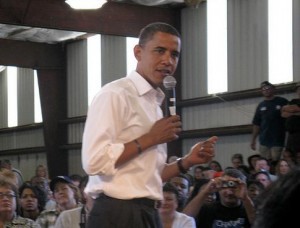Does Anything In The SOTU Affect Us Personally

Soaring rhetoric is important. I still remember that 2004 Democratic National Convention where then-Senator Barack Obama got up and gave his speech about blue states, red states, and the United States; I was electrified by it as I had never been before by live oratory.
Some of now-President Obama’s speeches since that initial breakthrough have been moving and memorable. Some of them have even affected me personally. As I’ve mentioned, we are all ACA poster-children here in this little Brooklyn apartment. It’s because of the passage of health care reform that Ben and I were able to strike out on our own, to try the freelance, DWYL thing. The ongoing experiment is still scary in several ways but it’s doable at all because of politics.
Last night, as you know, was the State of the Union, and so much of the annual SOTU pageantry is as predictable as fireworks in July. When a Democrat is at the lectern, there are abstract calls for more economic fairness: a higher minimum wage; higher taxes on the 1%. When Republicans respond, there are abstract accusations of class warfare and being unfair to job creators. It’s easy to get into the rhythm, to assume nothing will change: everyone will bluster for a while and then settle down and we’ll go on as we were, as untouched in our everyday lives by politics as we are by the music of the spheres.
Except, as Ben Dreyfuss points out on Medium, Obama seems to be out of fucks. Maybe something will actually change on the ground.
Here’s Slate’s John Dickerson, who agrees:
President Obama said, “I have no more campaigns to run.” Some Republicans in the audience applauded that line. It wasn’t intended as an applause line, and the president couldn’t let it go unanswered. “I know, because I won both of them.” He did not go on to refer to his rock-hard abs, but given the president’s confident, forward-leaning posture, it seemed like he might. …
The president pitched a series of policies aimed at the Erler family and all American families like it. The Erler Plan consisted of relief for their daily struggles — help with child care, relief for two-earner households, and paid sick leave.
Some of the other Obama initiatives he plans to work for over the next two years that could affect us personally on a basic, wallet-type level include various ideas that relate to how we finance education: subsidized 2-year community college, simplifying FAFSA, and modifying how we pay back student loans.
Obama plans to use his executive power to make all existing federal direct student loan borrowers eligible for the federal government’s most generous loan repayment plan. He had, two years in a row, asked Congress to make such a change, but the plan didn’t go anywhere. … The White House is also calling on Congress to exempt from taxation the student loan balances that are forgiven under any of the federal government’s repayment plans. The change was previously proposed in the administration’s budget request and recently appears to have some traction in Congress.
This was my favorite line of the night: “A better politics is one where we appeal to each other’s basic decency instead of our basest fears.” It makes me feel slightly more positive about where we could go and what might happen. Do you feel any optimism about the next two years, in terms of where we’ll go economically as a country or where you might go yourself? Might any of these policies affect you or your families in a real way?
Support The Billfold
The Billfold continues to exist thanks to support from our readers. Help us continue to do our work by making a monthly pledge on Patreon or a one-time-only contribution through PayPal.
Comments